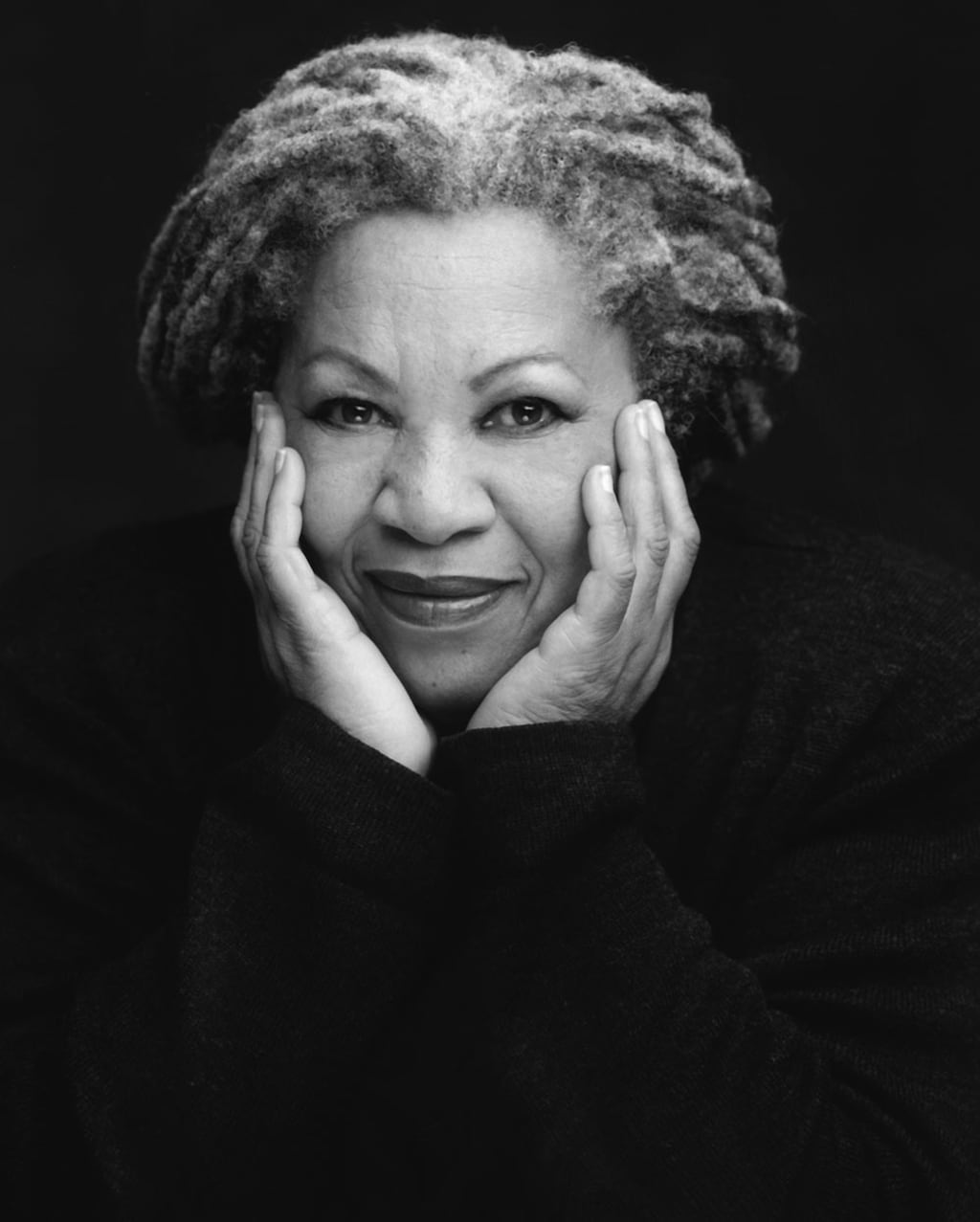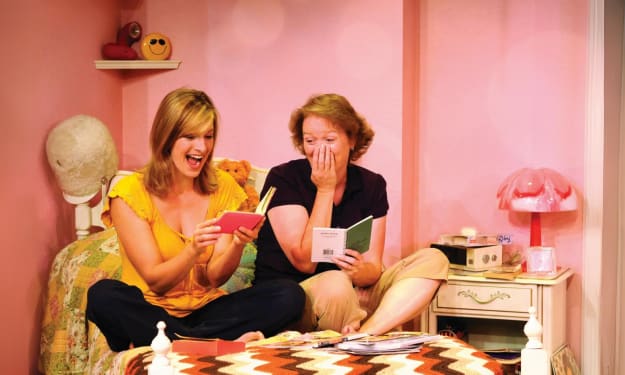An Unnameable Emotion
And Other Things I Hope She Knows Now

Somewhere between the confusion and the foreign ache in my chest, there were tears. They fell from my eyes, bulbous drops that stained the last yellowed page of the book in my hands. I sat cross-legged in the middle of my childhood bed, hinged at the waist and working to keep my cries muffled. The ache I felt bloomed within my ribcage, expanding further and further with each ragged gasp I took until it suffused me; there was warmth in its unfamiliarity, even as I still reeled with shock. I remember reading the final chapter of Beloved several times, desperate for understanding, desperate for anything my eight-year-old mind could grasp with surety. But all I found were tears. My younger sister came looking and when she discovered me there on the bed, sobbing into the book I’d been carrying around for weeks, she demanded to know what was wrong. When I couldn’t answer her, she ran for our mom, who would ask the same question. I lifted my head to them, my eyelids weighted with tears and a soft smile on my face, and whispered, “It’s just so beautiful.”
I cannot imagine myself without having read that book, and I’m not sure who I would be today if it wasn’t for Toni Morrison.

People come into your life a.) when you need them, and b.) for a reason— and she came at a time when I needed to escape. We were living beneath my father’s thumb, an eternity marked with immense tension and moments of unnerving violence; what abject poverty didn’t take from me, my father ripped away with merciless hands. By the time I got around to reading Beloved, I was more of a knot than a child, and I discovered whilst moving from one stressor to the next that I found great solace in reading. Books sustained my spirit and allowed me to imagine a world outside our cramped bungalow, though it wasn’t just my love for reading that set me on the path to Beloved. I also began writing at eight and was settling into the self-destructive notion of doing so for a living, but I found myself without clear direction.
This problem wasn’t obvious to me at first; I was too enraptured by this new form of creative expression to notice. It crept up on me, not a sensation of not knowing what to do— but not knowing if it was even possible for me to do it. Up to that point, I was unaware of any Black authors, and as I went through my lovingly curated library of Harry Potter and The Guardians of Ga’Hoole series, I discovered (after a quick Google search) that I had no books written by Black people to begin with. A question revealed itself to me: How could I be a writer if I didn’t know anyone like me who’d done it? I needed someone to aspire to be like, footsteps to follow, a shadow to rest beneath. I needed a role model.
That’s how I came to find Toni Morrison, though it was more by luck of my childish memory than pure fate. When my mother took me to the bookstore to remedy my issue of not having any Black authors in my collection, hers was the only name I could remember as I bounced between the aisles. I took home two of her books, the other being The Bluest Eye, without any knowledge on what they were about. All I had to go on was a hastily-memorized name and the image of an older Black woman on the back covers, an elegant train of greying locs tied back as to not fall into her soulful gaze. I stared at her for the longest time, equal parts intimidated and warmed by the intensity of her eyes, heedless to the journey she and I would go on together.
I read Beloved several months removed from receiving it, because an unsuccessful campaign to finish its counterpart left me discouraged; I was afraid that the tragedy permeating The Bluest Eye would find me again if I tried, and I was right to fear that. Almost from the first page, dread was a distinct theme of Morrison’s most lauded book and it hit me in my gut. As Sethe and Denver’s house shook with the wails of a spectral baby, so did mine; their anguish and frustration leapt from the pages as if I was standing before them, and I sunk into it. Morrison’s way of weaving words was unlike anything I’d even thought possible, but don’t get me wrong— it confounded me every step of the way. The amount of backtracking and re-reading I did ultimately contributed little to my understanding of her metaphors and allusions; I was only a kid after all. However, when I got to the end I could feel what she was trying to convey: the emotions came rushing in all at once and broke open a levee within me. At the time, I couldn’t name the sensation that moved me to tears, but I know now that it was wonder.

I like to think that that was the day Toni Morrison touched my life. After I stopped crying, I knew that I’d never want anything more than to be a great writer like she was. I dedicated my energy to studying her style and attempting to refigure mines in her likeness, I venerated her to anyone who would listen, and I made a promise to myself to meet her one day to let her know all she’d done for me.
It’s remarkable what one unnameable emotion can give birth to if you never let go of it. I kept that wonder close to me, even now it never leaves my side, and I’ve let it drive me not just to be a better writer, but a better friend, a better sister, a better woman, a better person. My biggest motivator is to make an impact in someone’s life, as Toni Morrison did for mine; to be able to replicate what I felt, however marginal, in another has become my source of self-regard. It’s this inclination that led me to childcare and nonprofit work, what led me to donate blood and time to those who needed it, what led me to be a listening ear rather than a wailing spirit. It was through her work that I was able to grasp empathy’s cool hand and let it guide me through life, though I do buck from its embrace sometimes. I hoped to tell her all this when I met her, how I sought to be more thanks to her.
I was never any good at math, but if I could calculate up all the moments I spent fantasizing about meeting Toni Morrison it would probably round up to a slant forty-five percent of my life. I wanted our paths to cross when I’d made my big break onto the writing scene, maybe during one of the seminars or talks she hosted after retiring from fiction, perhaps something as docile as an unexpected exchange in a coffee shop. Anything would’ve done. I wanted to hold her hands, which I always imagined would be soft and cold; I hoped to hug her for a long time, perhaps a bit longer than what’s socially acceptable; I wished we’d cry together like old friends reuniting, two halves of the same soul coming together to roost. She needed to know what she meant to me, that I loved her for all that she’d done, that she inspired me. I won’t get that chance though.
A day after the fact, I finally got word of her death by way of my sister, who knew of the depths of my love for her. She was there while I grieved openly and loudly, so unlike when I was struck with wonder all those years ago. My regret is bottomless: to this day I still grapple with my own inability to have met her before she passed. I suppose in my reverence of her, I forgot that she was mortal flesh and bones, just like anyone else. It’s hard when confronted with your idol’s ephemerality, even as it stares at you from the seat of a wheelchair or in the gentle creasing of their face.

As this draws itself to a close, I can’t think of anything markedly optimistic to say: I’m still mourning the loss of a woman who never knew me. It’s sad in a pitiable way if you take it for face value. That’s the most obvious nature of loving celebrities or people who live, seemingly, on another plane of existence: their lives and deaths impact you in a much more resounding way than vice versa. It’s that simple complexity (or is it complex simplicity) that rattles us commonfolk if we dwell on it too long because it can snowball into us wondering about how ‘small’ our lives are in comparison; that’s what I’ve had to confront while going through my stages of grief. In a way, her death, her life, her work, and my love has left me haunted— just as 124 was, pestered by what-ifs and what-could’ves, by heartache and anguish and misgivings. I can’t say if I’ll ever be able to exorcise them or if they’ll shrink down as time moseys on into something more manageable, easier to swallow and sidestep. I’ll be sure to let you know if I ever do, until then I’ll be carrying them. Them and that wonder she gave me.






Comments
There are no comments for this story
Be the first to respond and start the conversation.